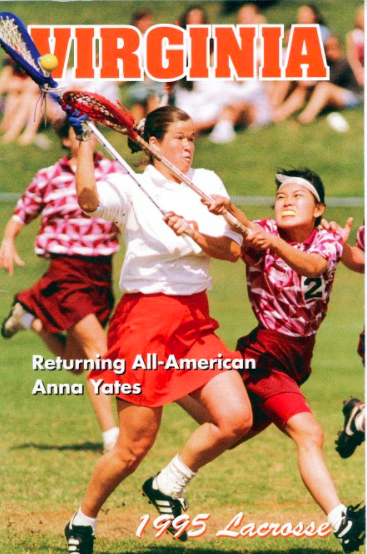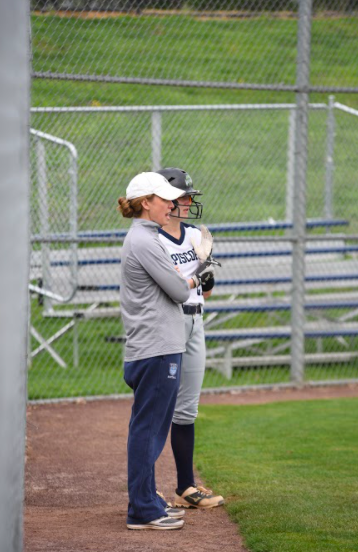John Bishop ‘22
Although Anna McDermott admits it was tough managing athletics and academics in college, she would “absolutely” do it all again. Students may be surprised to learn that many of their teachers played collegiate sports, a path that some Episcopal athletes are choosing to follow. Through their personal experiences, these faculty members hope to guide Episcopal’s current students in the next stages of their athletic careers.

Photo Courtesy of Anna McDermott
Michael Letts, Head of Upper School, played soccer at Bucknell University. He explains, “I was recruited for soccer. I went to the visit and really liked the guys, the coaches, and the school. I liked the idea of playing Division I and the community.” When asked about his experience of playing soccer, he said, “It was an honor to represent my school. It’s a special kind of pride when putting on the Bucknell jersey.” However, it is not always easy for students-athletes to manage all of their responsibilities.
Letts admits that balancing academics with athletics and trying to have a social life “was tough. Handling the academics with the training schedule is like a part-time job on top of athletics, and there isn’t really a social life outside of the team, especially during the season.” He continues, “I had to learn how to manage my time properly. It taught me really good discipline.”
Letts has two pieces of advice for the EA’s future collegiate-athletes: “Make sure you fully recognize the commitment it requires. Know that your time and energy are going to be spent on your sport. Also, make sure it is a good fit for you. Think about what place will allow you to be successful.”
“It was an instant community. I never felt isolated or without anyone to turn to,” says Kelly Edwards, Head Coach for Girl’s Varsity Softball, who attended Ithaca College. “I was recruited for softball and walked on for soccer. I ultimately chose Ithaca because they had given me an academic scholarship.” Edwards explains that the balance between athletics, academics, and social life kept her “efficient during free times and really helped me with time-management.” She elaborates, “It was a great life lesson to learn how to deal with it and how to be humble.” Edwards advises students to “realize there is a learning curve from high school to college. Be flexible to different situations and it is always team first, not yourself.”

Photo courtesy of Josie Tomaino
Bryan McDermott, Assistant Coach for Boys’ Varsity Lacrosse, played lacrosse for Penn State University. “I walked on to Penn State. I was originally unsure whether I wanted to play lacrosse in college or not.” Reflecting on his time with Penn State, McDermott says, “The best part was being able to play day-in and day-out with my teammates. It was such a different level of competition that I loved being a part of. I just loved to do it.” When asked how he managed his commitments, he says, “I personally did worse with more free time. So, having a structured practice six days a week really helped me. People also look out for you, especially during the season.”
McDermott agrees with Edwards and recognizes the necessity of being “prepared for the learning curve and expanding your skills so you can keep your spot. Embrace the challenge of change.” Most importantly, he adds, “Just enjoy it; you only have so much time to play.”
“The greatest reward about it was I got to continue playing the sport I love. I loved the overall challenge of playing college sports, the memories I made, and the relationships I built with my teammates,” Zachary Richards, Head Coach of Boys’ Varsity Track, explains about his time playing football at Bucknell University. He recalls, “I was recruited for football. I chose Bucknell because I felt it was the best academic possibility, and they wanted me to be a part of their program the most.” Managing football, school work, and social life “wasn’t easy, probably took a full semester to figure it out” due to the fact that he had “a lot more commitments than the average college student, such as 5am workouts.” In fact, Richards confesses, “I often envied other students at the time.”
Though football was his passion, Richards stopped coaching the sport when he became a form dean. He adds, “the time-commitment was too much for me to do both.” As a coach, Richards emphasizes the importance of “enjoying everyday you have to play the sport you love.”
Anna McDermott, Upper School History Teacher, was recruited to the University of Virginia to play lacrosse. She explains, “It was between Brown, Harvard, and UVA, and the question I asked myself is if I broke my leg and couldn’t play lacrosse – I was kind of looking for a well-rounded, scholar athlete school and [UVA] kind of fit the bill.” McDermott reflects fondly on her time playing lacrosse at UVA and would do it all over again in a heartbeat. “Sports are just such a big part of my life. I feel like the team-player aspect just makes me a better mother, a better colleague, and able to work with all different kinds of kids. And in sports, not everything is perfect, you have to learn how to overcome obstacles and go through adversity and I feel like that is the biggest thing I got from sports. You learn just as much from losing as you do from winning.”
McDermott’s team won the Women’s 1993 Lacrosse Division I Championship, with McDermott being recognized as an Outstanding Player, but those are not her favorite memories. She notes, “you would think it would be the All-American place, or being the captain of every team I have ever been on, or winning the national championship. And those are all great. But really, the relationships, with the coaches who are like mothers and friends and role models. And the women that I played with are just phenomenal. Really, the relationships trump the accolades. It is the people you remember more than a player or a goal or that sort of thing.”